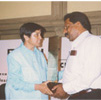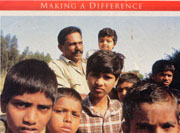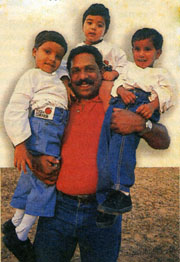 |
|
|---|
By B R Srikanth |
14th December 1998 |
|
| An Ex-Convict Sets Up A Home For Children Of Prisoners | ||
AT 10 every morning, 20 children leap out of a beige Maruti van outside the government school at Hosakote, a town as chock-full as the Bangalore-Chennai national highway that bisects it. Their immaculate uniform and affluent mode of transport seem strange, considering almost all other children trek to the rural outreach, and don't follow a dress code because the school doesn't have one. What's also unique about these children is the reason that unites them: all have one or both their parents in jail.
They're under the care of 45-year-old Reny George. "Daddy", as he's called by these children, is a former convict who's now working for their betterment. He's the guardian of at least 30 children whose parents are serving prison terms in Bangalore, Belgaum and Mysore, and a few others whose parents have been victims of crime. Reny set up the Precious Children's Home in 1996, a year after he completed a 14-year and 9 months sentence for murder during his student days. "Those days are over. I'm doing my duty as a citizen," says Reny, emphasising how he's working to erase the stigma that haunts children of prisoners. Most of these children were either languishing in jail along with their parents, or were under the care of relatives in remote villages. Some were denied admission in schools because of their parents' criminal status; few others had to drop out because no one would pay their fees.
Says B.S. Abbai, jail superintendent at Central Prison, Bangalore: "They (Reny and wife Tina) have been doing good work. They visit the jail regularly; bring the children to meet their parents. They counsel women prisoners on health and hygiene and give them toiletries."
Reny's efforts at educating these children are being backed by the Church of South India's Council for Child Care, Caruna Bal Vikas and some "generous friends", but such is the cost of running such a novel project that Reny has had to move to the outskirts of Hosakote. "I've moved to this village because it's very expensive to be in the city," he says explaining how he has to spend about Rs 50,000 to Rs 60,000 a month, paying rent for the building, food, uniform, paying the cooks and the driver who takes them to school.
Reny runs the boarding under the aegis of the Prison Fellowship of India, and has about 35 children here from age five to 12. Besides, he supports 100 other children of prisoners in other parts of Karnataka through payment of school fees, supply of uniforms and a cultural get-together twice a year.
How do people react to a project being run by an ex-convict? "It's a human tendency to treat me with suspicion because I've served a sentence. No matter what I do, they have this indelible impression about my past," he says. A past Reny is extremely touchy about. "I have a family now and don't want to look back. Please describe me as an ex-convict, that's it," is his refrain.
He offers no explanations about why he committed the crime he was convicted for. He'd rather the children at his place be written about. The oldest, Gajendra, is 12 and a budding athlete who has won a district-level race. "He'll now take part in the state-level athletics competition in Bangalore. He's keen to become an advocate," says Reny. At five, Jyothi is the youngest of them all, and is often carried around by volunteers at the Home.
Interestingly, there are at least two brother and sister pairs here because their fathers have been incarcerated. Almost in a chorus, Mary, 8, her brother Jayasheel, 7, reply they are under Reny's care because their father Prakash is in prison.Ditto with Mamata and Chandru, from Mysore, who allege that their father Manoj has been implicated in the case of their mother's murder though another man was responsible for the deed. Nine-year-old Naveen is equally nonchalant about why his father Ganesh is serving a life term at the Bangalore jail.
Most of these children want to become either policemen or lawyers when they grow up—the role models they've been exposed to during the trial of their parents. Sachin Tendulkar is yet to make an impact on them, though they throw the bat around in the backyard of their new home. Want to know more about the man and his mission: Call Reny at (0091 80) 28465928 Cell: 9448314323.
![]()

Reny George set up the Precious Children Home in 1996, a year after he served his 14-year sentence for a murder during his student days. - By B.R. Srikanth - Correspondent, Outlook (Dec. 14, 1998).

 By Stephen David, Bangalore - Correspondent, India Today (Malayalam) March. 24, 1999.
By Stephen David, Bangalore - Correspondent, India Today (Malayalam) March. 24, 1999.
EX-CONVICT OFFERS LIFELINE TO PRISONERS' CHILDREN
Seventeen years ago Reny George killed an elderly couple in Kerala for money. A changed man today, he spends his time counseling prisoners and running a Home for their (prisoners) children and orphans. He was released from the central prison in Trivandrum in 1995 on completion of his 15-year term of imprisonment.
Mr. George, along with his three foreigner friends, made headlines in 1980 for the ghastly crime. He hit headlines again when he became a totally changed person in the prison, a true Christian in letter and spirit. Once a drug addict, is now a good samaritan, fully atoned for his past.
By Soman Baby, Correspondent Gulf Daily News April. 16, 1998.

